Turning Point Scotland was first introduced to Citizenship more than nine years ago. Citizenship is an innovative model for community integration and social inclusion developed by the Yale Program for Recovery and Community Health (PRCH). The ideas behind the approach originated by way of Michael Rowe (co-director of PRCH) and his experiences of delivering mental health and homelessness outreach services.
The Citizenship Framework is a holistic approach promoting recovery, inclusion of people experiencing drug use, mental health challenges, homelessness and learning disabilities by focusing on a person’s strengths and the valuable contributions they can make to their communities. Citizenship is defined as a measure of the strength of an individual’s connection to the 5 R’s of rights, responsibilities, roles, resources, and relationships that society makes available to its members.
Closely linked to the 5 R’s, belonging, sense of identity and valued roles and recognition are a critical component of Citizenship.
Our commitment to Citizenship is a key part of our organisational strategy. Our understanding of citizenship, of people’s right to a sense of belonging, a positive identity, which is not bound to services and a valued role in their community underpins everything we do.
Since Citizenship was introduced to Turning Point Scotland, Citizenship facilitator roles have developed to allow all staff to move from a place of knowledge building to translating the concepts of Citizenship into day to day practice. This practice is fundamental to everyone we work with. All staff across the organisation are able to attend Citizenship workshops and have access to a Citizenship champion locally.
Turning Point Scotland have created a short film to bring Citizenship to life by our facilitators on what Citizenship means to them, their services and how it is put into practice.
If you have any questions, please contact Karen Black, Citizenship and Research Manager, KarenBlack@turningpointscotland.com .

